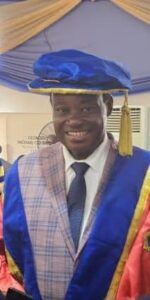Jimoh Ibrahim Bets on Books, Not Politics
~ With a ₦100m bursary, bills for new institutions, and the University of Fortune in Igbotako, the Senator makes education the blueprint for Ondo South’s Renaissance.
~ Ogungbemi Adeyemi Orimisan

Education is destiny. Communities that invest in it rise; those that ignore it remain trapped in cycles of poverty. For too long, Ondo South has watched its brightest minds leave in search of opportunities elsewhere. But today, there is a deliberate effort to reverse that tide—led by Distinguished Senator Jimoh Ibrahim, Ph.D, CFR.
Senator Ibrahim understands the power of education not in theory, but in practice. His own life is a testimony. From his humble beginnings in Igbotako, he pursued learning with unusual determination, gathering degrees from Obafemi Awolowo University to the University of Oxford and Harvard. His story is not just one of personal triumph—it is a lesson for every young person in Ondo South: education opens doors that nothing else can.
Yet what makes his journey more compelling is that he has not walked alone. He has pulled others along the path. Over the years, he has quietly funded degree and postgraduate education for many young Nigerians, ensuring that financial hurdles did not block academic dreams. His interventions have lifted not just individuals but entire families.
The most striking of these efforts came recently with his ₦100 million “Welcome Back to School Bursary” for students across Ondo South. A ₦100m bursary is not a handout; it is an investment in the future of Ondo South.”
In a country where education is often sacrificed on the altar of poverty, that gesture spoke volumes. It was not a handout—it was an investment. It told students, “You belong in the classroom, and you will not be left behind.” It also told parents, “Your children’s future matters, and we are committed to it.”
Inside the Senate, Ibrahim has matched philanthropy with policy. He has sponsored multiple bills seeking to establish higher institutions in Ondo South, knowing that the region’s long-term growth depends on accessible centers of learning. A university is not just a place for lectures; it is a hub for jobs, innovation, and community renewal. Each bill is therefore a building block in the larger project of revitalizing Ondo South.
Perhaps the most ambitious symbol of this vision is rising in Igbotako: the University of Fortune. Nearing completion, the institution promises to place Ondo South firmly on the academic map. Once operational, it will train thousands of young people locally, reducing brain drain and giving the region the tools to compete globally. For a district often overlooked in development planning, this is a rare, bold intervention.
Critics may say these are lofty projects. But Senator Ibrahim’s track record shows otherwise. From scholarships to bursaries, from donations of infrastructure to consistent advocacy for education, his actions form a pattern. They are not isolated gestures; they are the deliberate strokes of a leader sketching a blueprint for renaissance.
And renaissance is precisely what Ondo South needs. The oil-rich region has endured underdevelopment despite its resources. Roads have decayed, industries have collapsed, and opportunities have dried up. But education—accessible, quality education—can spark a new chapter. It can equip young people with the skills to innovate, attract investment, and rebuild the district from within.
This is why Senator Ibrahim’s blueprint deserves attention. It is not about politics in the narrow sense. It is about creating a future where Ondo South does not send its youth away in search of hope, but instead trains and retains them at home. It is about ensuring that the next doctor, engineer, tech innovator, or policymaker from the district does not have to struggle against impossible odds.
The people of Ondo South now face a choice. To dismiss these efforts as routine politics, or to recognize them as the seeds of transformation. Believing in Senator Jimoh Ibrahim’s legislative direction is not about sentiment; it is about common sense. When a leader puts education at the center of his vision, he is not just solving today’s problems—he is preparing tomorrow’s solutions.
When a leader puts education at the center of his vision, he is not just solving today’s problems—he is preparing tomorrow’s solutions. The true wealth of Ondo South is not beneath its soil but within its people—and Jimoh Ibrahim knows it.
